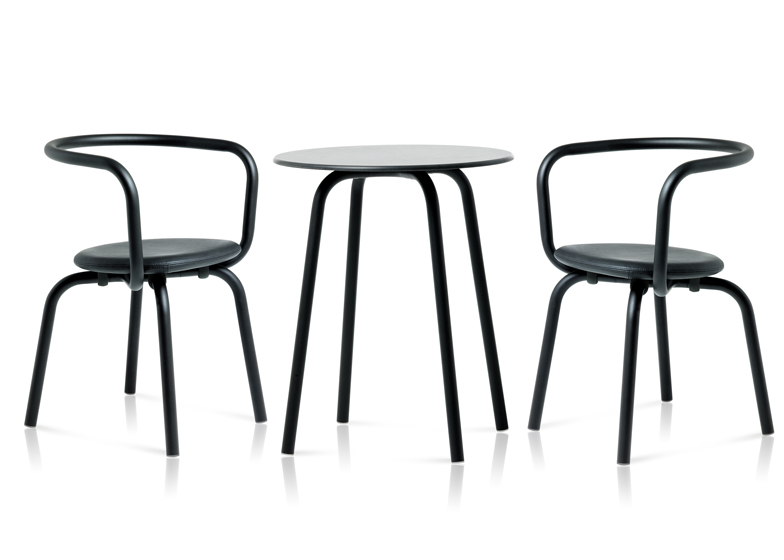Milan 2013: a collection of furniture designed by Konstantin Grcic for Herzog & de Meuron's Parrish Art Museum in Long Island has gone into production with American brand Emeco.
Presented at Salone Internazionale del Mobile, the Parrish collection of chairs and tables by Konstantin Grcic for Emeco was originally created for Herzog & de Meuron's barn-like Parrish Art Museum, completed last autumn.
The pieces are made from tubular recycled aluminium, held in place under the tractor-inspired seat by a component with six connecting points referred to as "the heart".
The range now includes a lounge chair and side chair plus tables in two heights, made of sandblasted aluminium with clear, red or black finishes.
Chair seats come in wood harvested close to the Emeco factory in Pennsylvania, upholstery in leather or fabric, or reclaimed polypropylene like that used in Philippe Starck's Broom chair shown last year.
Emeco is famous for aluminium furniture, having created the much-copied classic Navy Chair for the American armed forces in 1944. In recent years they've produced chairs with top international designers including Jean Nouvel, Philippe Starck and Michael Young. See all our stories about chairs by Emeco.
Other products by Grcic in Milan included a remake of Achille Castiglioni's iconic Parentesi lamp for Flos, and angular wooden stools and tables for Italian brand Mattiazzi. See all our stories about design by Konstantin Grcic.
See all our stories about design at Milan 2013 »
Here's some more information from Emeco:
Detailed to perfection with a classic appearance, the Parrish Collection by Emeco and German designer Konstantin Grcic was first made for the Parrish Art Museum in Water Mill, New York.
The externally modest building of the Parrish Art Museum holds an internal complexity, just like the Parrish Collection - a set of chairs and tables with a subtle design and a heartfelt technical core. “Developing the mobile interiors for the Parrish Art Museum brings us to the peculiar psychology around chairs used in public spaces – exploring the idea of comfort using very little material.
Considering the public self-awareness in a museum seat, the Parrish chair was given a generous seat and a round tube, forming a belt that defines the space around you - a space where you can feel protected,” says Konstantin Grcic.
The Parrish lounge and side chairs are part of a modular collection, featuring three frames with four optional seats. The recycled aluminum sandblasted frames are available in clear anodized, red or black powder coated finishes.
The frames can be combined with different seat types; reclaimed polypropylene, locally sourced wood from Lancaster, PA, Danish fabric from Kvadrat or three luxurious leathers from Spinneybeck. These choices enable different combinations, creating a versatile family. All chairs with reclaimed polypropylene seats are suitable for outdoor use. The table bases are available in two recycled aluminum sandblasted finishes, the clear anodized aluminum finish or the black powder coated finish, in two different heights as café and side tables, which can be combined with two alternative Trespa table tops in pastel grey or black.
“The collaboration with Emeco was always an important part of the project, something I had in mind as an obvious choice for the kind of furniture we needed. It is simply the only company I could think of who could bring a nice mix for this interior concept, specialists in aluminum, delivering another kind of material appearance, environmentally sound, perfect for the both indoor and outdoor and being such a truly American company - it was a perfect match,“ says Grcic.
“When Konstantin asked me if Emeco would be interested in collaborating with him on the Parrish Art Museum I was thrilled. Konstantin is one of the most innovative and original industrial designers of today,” says Emeco’s CEO Gregg Buchbinder. “Konstantin’s degree of perfection combined with his analytical rigor made the product development process deliberate and thoughtful. He managed to leverage our heritage and at the same time push Emeco into the future. The Parrish Chair reminds me of something Le Corbusier might have designed in the 1920’s; yet at the same time, it looks fresh, modern, and original – it’s a real artifact of our current culture, a future classic,” Buchbinder continues.
“I have always had a fascination and admiration of the hard physical labor of the production of the iconic Emeco Navy chair. My ambition for the collaboration was, therefore, to do something that uses the same aluminum work but makes the process more effective, less physically challenging. I think the design of the Parrish chair comes from a close understanding of what Emeco can really do,” says Konstantin.

